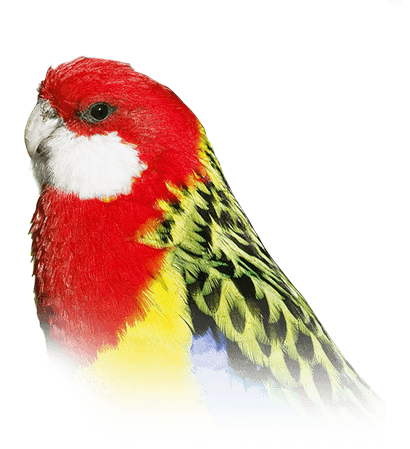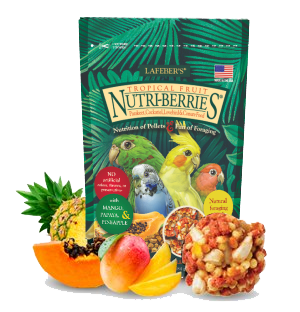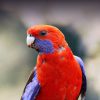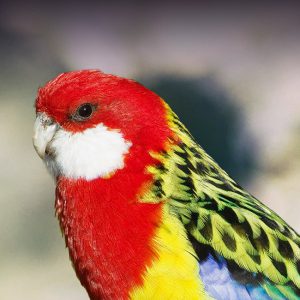
If you want a gorgeous bird for an aviary or habitat setting, or have the space in your home to give this bird the appropriate room, then the golden-mantled rosella might be the bird for you.
- Color
Multi Colored, Red - Size
small - Lifespan
Up to 30 years - Sounds
Chatterer, Whistler - Interaction
Somewhat social

- The golden-mantled rosella is the most popular rosella species kept as a pet
- Diet & Nutrition: Parrot food
Want to stay up-to-date on Golden-Mantled Rosellas?

What Is A Golden-Mantled Rosella?
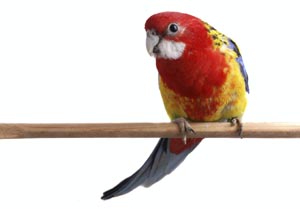 The golden-mantled rosella, often called the Eastern rosella and the white-cheeked rosella, originates in Australia and is the most colorful and popular parrot of the rosella family. The golden-mantle rosella parrot is a favorite among fanciers because of its stunning appearance and gentle nature. It is possibly the most stunning of the rosellas because of the palate of bright colors that grace its feathers. It has a crimson head and chest, white cheeks, bright yellow belly, cobalt shoulders, flight and tail feathers, a pale green underbelly and a darker green back. Its beak is white and its feet are a light gray. This bird looks like piece of art. It is about 12 inches long, about the size of a sun conure, though its tail is longer, its head is smaller, and it has a more slender appearance.
The golden-mantled rosella, often called the Eastern rosella and the white-cheeked rosella, originates in Australia and is the most colorful and popular parrot of the rosella family. The golden-mantle rosella parrot is a favorite among fanciers because of its stunning appearance and gentle nature. It is possibly the most stunning of the rosellas because of the palate of bright colors that grace its feathers. It has a crimson head and chest, white cheeks, bright yellow belly, cobalt shoulders, flight and tail feathers, a pale green underbelly and a darker green back. Its beak is white and its feet are a light gray. This bird looks like piece of art. It is about 12 inches long, about the size of a sun conure, though its tail is longer, its head is smaller, and it has a more slender appearance.
Native Region / Natural Habitat
The golden-mantled rosella is native to southeast Australia and Tasmania. It inhabits open forests, woodlands, gardens as well as parks, and its wild diet consists many of native grass seeds, herbs, fruits and flowering buds.
Care & Feeding
Rosellas need space and a good diet to thrive. The largest cage you can afford is ideal, but be careful that the bars are the correct spacing for a bird with this head size. An aviary situation is great for rosellas, which will live peacefully together in a large enough space. Rosellas also love to bathe, so offer a shallow dish or pan of water for bathing.
A rosella’s diet should include lots of fruit and vegetables, and some healthy table foods. Your hand-fed, tame rosella will love to sit on your shoulder at the dinner table, and will be quite well behaved, unlike many birds that will tend to wander. This is a good way to reinforce the bond between you and your bird, and you can feed him tidbits from you plate. These birds are reported to live for more than 25 years if cared-for properly.
Personality & Behavior
A gentle, easy-going bird, the golden-mantled rosella can be an ideal family pet. It is not a cuddler, and will not stand for much petting, but will be content to ride around on your shoulder. A very tame rosella is a good bird for a child who is mature enough to behave properly around any bird. As with all birds, there is the possibility of biting, so be careful with a child’s tender fingers. Rosellas make great aviary birds, and will still retain their pet quality in a flighted situation if you take the time to play with them.
A well-socialized golden-mantled rosella can become quite attached to you and will relish your company. He may become despondent if you do not have to time to spend with him. In this case, you may want to consider two.
Speech & Sound
The golden-mantled rosella is not a consistently noisy bird, save for some chattering and shrill contact calls, which can be loud. The golden-mantled rosella is not a great talker, but it might pick up a few simple words. If you want a great whistler, the golden-mantled rosella is a bird for you; play a CD of whistle songs while you are at work, and you might find that your rosella picks up tunes easily.
Health & Common Conditions
Rosellas housed in aviaries ground forage, which makes them more susceptible to fungal infections and intestinal worm infections, which means diligence in keeping their enclosure clean. Rosellas are also susceptible to psittacosis.
Golden-Mantled Rosella Populations In The Wild
Rosellas, including golden-mantled rosellas, are more likely to be available from a bird breeder or from an avian-specialty store.
Have Questions? Contact Us!
Lafeber is a family company dedicated to its customers and the health of all animals. We really value feedback, and if you have any questions or concerns, please do not hesitate to contact us.
Please email: customerservice@lafeber.com Or call us and a real person will pick up the phone: (815) 888-4040


